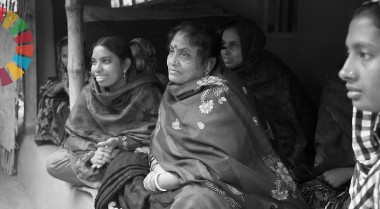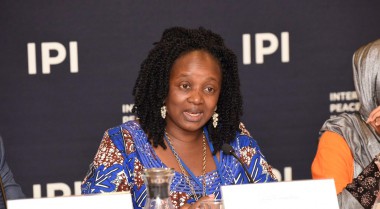
#HLPF2020: How local peacebuilders tackle crises
Together, peacebuilders are making the case; meaningful inclusion of local peacebuilders contributes to peaceful, just and strong institutions and is needed to effectively tackle COVID-19 and other crises. Let's accelerate SDG16+ by supporting local peacebuilders, and communities and working together!
The current responses to the COVID-19 pandemic demonstrate the critical link between strong institutions and a people-centred approach by state authorities. Countries which have managed the crisis competently have well-established institutions at the national and local levels, that have the capacity to mobilize personnel and resources to respond to the needs of citizens. Conversely, countries where civil society lacks awareness of and is not included in implementing laws, visions, and plans that contribute to sustainable development priorities will face critical barriers to finding an effective response.
Among all the Sustainable Development Goals (SDGs), SDG16 was designed specifically to “promote peaceful and inclusive societies for sustainable development, provide access to justice for all and build effective, accountable and inclusive institutions at all levels”. It, therefore, offers countries, developed and developing, a sound framework to adopt a people-centred approach while assessing and articulating their priorities.
Health systems under COVID-19: Trust and accountability essential
Let us take the institution of local health systems as an example. If the system is working well and people place trust in it, restrictive measures or medical advice are taken seriously. The curve is flattened and lives saved. Crucial here is that citizens know that governance structures are well established and working in the interest of all citizens. However, when trust and accountability are absent, governments and citizens no longer work side-by-side to effectively counter the crisis and ultimately sustain peace and stability. This clearly shows how crucial it is for states to adopt a transparent, responsive, inclusive, and participatory approach to a crisis such as COVID-19 - something which can only be achieved through strong institutions.
Building strong institutions: The unique role of local peacebuilders
Just as it holds true for the health system, strong and inclusive institutions are equally essential to sustainable peace. Building such institutions requires the meaningful involvement and engagement of peacebuilders, as they connect decision-makers with local communities. Due to their direct access to and knowledge of local contexts, local peacebuilders, including women and youth, are in a unique position to build bridges between decision-makers and communities, and to foster political inclusion and understanding of the sustainable development agenda and the SDGs. Voluntary National Reviews offer countries an opportunity to reflect on their progress in implementing the SDGs. Even though local peacebuilders are indispensable partners in this process, their expertise is often not taken into account. In such situations, local civil society peacebuilding organisations can undertake their own parallel reviews - as has been done by GPPAC members in Ghana, Cameroon and Uganda. All three reviews unanimously highlight the need for strong and inclusive institutions that embrace the SDG16 agenda. In the face of a crisis such as COVID-19, this is more important than ever.
This piece was written by GPPAC’s Influencing Policy Working Group. The Influencing Policy Working Group analyses the latest global peacebuilding policies and methods and uses this to develop GPPAC advocacy positions. The expert group strengthens the capacity of civil society organisations to lobby and advocate on a regional and global level, increase access, political space and opportunities for civil society to engage with relevant stakeholders, and provide civil society perspectives into different policy processes (for example through the UN-CSO Prevention Platform hosted by GPPAC).

